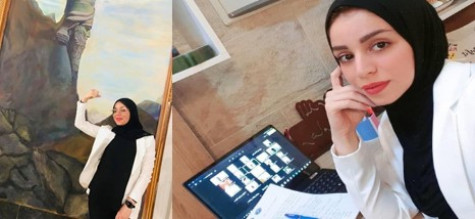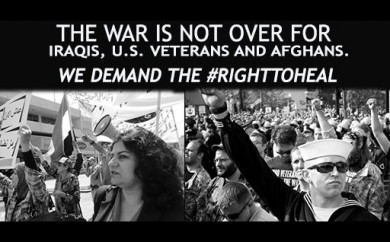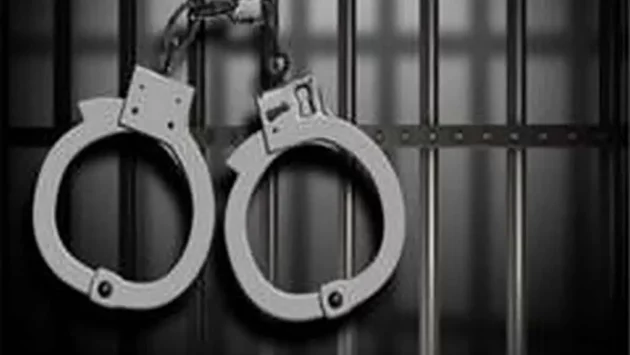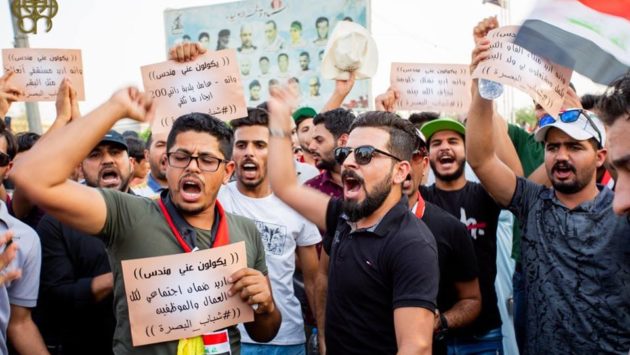GCHR’s 18th Periodic Report on Human Rights Violations in Iraq
The first anniversary marked a prominent WHRD’s assassination
The first anniversary of the assassination of a prominent woman human rights defender, nutrition and fitness specialist Dr. Riham Yaqoub (main photo), was marked on 19 August 2021. A year ago, she was killed by unidentified gunmen who fired rounds of bullets at her car while she was driving near the intersection of the commercial street in the center of Basra, accompanied by her sister and friend, who were slightly injured when the car windows shattered. Her colleagues and other Iraqis recalled on social media how her life was filled with peaceful human rights activities and noted her achievements in acquiring and disseminating scientific knowledge among people, especially women. They also emphasized that she stood against injustice openly and without fear.
GCHR demands that the Iraqi government make every effort to reveal the killers of Yaqoub and other civil society activists who lost their lives for their active participation in the peaceful popular movement that began in early October 2019 to demand comprehensive reform in the country.
Engineers attacked while peacefully protesting
On the morning of 09 September 2021, engineers demanding jobs organized a demonstration in the protest square near the governorate building in Al-Amarah, the capital of Maysan Governorate. The Riot Police assaulted them and arrested a number of them before releasing them on the same day. The demonstrators had closed the office of the Maysan Governorate Electoral Commission, which came “as an escalating step to demand that they be included in appointments, like the rest of the governorates,” according to press reports. The Maysan Governorate Police Directorate issued a statement on the same day saying, “There are those who are trying to divert the demonstration from its peaceful path and demonstrate in front of the Independent Electoral Commission building, although it is not concerned with their demands as they are oil engineers.”
Family of kidnapped human rights lawyer attacked
On the evening of 02 September 2021, Hammoud Hattab Al-Heliji, the brother of the folk poet Jaseb Al-Heliji and the uncle of human rights lawyer Ali Al-Heliji, survived an assassination attempt carried out by two gunmen riding a motorcycle. On 12 March 2021, GCHR documented the assassination of Jaseb Al-Heliji, who made a great effort and raised his voice in protests in order to find his son Ali Al-Heliji, who was kidnapped on 07 October 2019 in Al-Amarah.
Journalists and Internet activists attacked and arrested
Large numbers of Iraqi journalists fear for their lives due to an increase in targeted violence against the profession during the past two years, which led to some of them leaving their jobs. Despite the risks, the authorities have failed to implement measures to support journalists and protect the rights to freedom of expression both online and offline. In the past weeks, a number of journalists have been targeted for their work.
On 06 September 2021, a journalist and correspondent of Salah Al-Din Satellite Channel, Hamid Al-Jumaili (photo above), was killed by his son in their house located in the Al-Dujail district in Salah Al-Din Governorate, 60 km north of the capital, Baghdad. According to the Iraqi security sources who gave an account to GCHR, “the authorities were able to arrest his son two hours after he committed his crime.”
At dawn on 04 September 2021, the house of journalist Ali Fadel (photo above), located in the village of Shafta, in the Baqubah district, the capital of Diyala Governorate in eastern Iraq, was targeted with a sound bomb, which left damage to the roof of the house, and frightened the family, especially the children.
The Press Freedom Advocacy Association in Iraq documented that the security forces in Kirkuk Governorate, on 04 September 2021, detained five journalists (photos above). They are Anadolu Agency correspondent Eugene Gula and cameraman Hisham Mohammed, NRT channel correspondent Diyar Mohammed, and cameraman Ali Baghdadi, and a correspondent of Kirkuk TV, Yousif Murad. They were arrested while covering security incidents in the village of Shaal in the Sarkaran sub-district in the Dibis district of the same governorate. They were taken to a police station in the area, interrogated, and their press equipment was checked to ensure that the security forces were not covered or filmed in the village, before being released after more than two hours.
On the evening of 26 August 2021, National Security Apparatus forces in Basra Governorate, dressed in civilian clothes, arrested Internet activist Hussain Al-Shahmani (photo above), before releasing him after three days without providing the reasons for his arrest. Al-Shahmani is known for the videos he records on social media, in which he criticizes corruption and poor public services, and talks about important corruption issues related to tax evasion and illustrating government failure towards citizens.
Civil society activists targeted
The targeting of civil society activists participating in the current popular movement, which began on 01 October 2019, has not ended, despite the great promises made by Prime Minister Mustafa Al-Kadhimi’s government over the course of more than sixteen months.
On 28 August 2021, unknown persons placed a sound bomb in front of the house of woman civil society activist Hamdiya Al-Saadi in the Sumer neighborhood in the center of Nasiriyah, the capital of Dhi Qar Governorate.
GCHR contacted civil society activists in Dhi Qar Governorate, and they informed us that this targeting is not far from the other targeting of other activists over the past two years, as it is a continuous attempt to discourage them from continuing to protest against corruption in the country, according to their statements.
Politicians targeted
With the approach of the Iraqi elections scheduled for 10 October 2021, new methods of violence are emerging in an unstable political atmosphere, which indicates the intensification of electoral competition and the emergence of these undemocratic practices.
Innocent civilian citizens harmed
There are new dangers facing Iraqis these days, namely the return of terrorist operations targeting civilians, as well as the military operations carried out by the Turkish army in the north of the country, to pursue the Kurdistan Workers Party, which is active in the Kurdistan region of Iraq.
On 03 September 2021, a Turkish drone targeted Makhmour camp in Nineveh Governorate, which houses Kurdish refugees from Turkey, injuring a number of civilians (photo above).
On 30 August 2021, an explosive device exploded that was placed on the side of the main road between the villages of Sammakah and Al-Samoud, south of the Daquq district of Kirkuk Governorate, killing a citizen and wounding ten others.
On 17 August 2021, a hospital in Sinjar District, Nineveh Governorate, was subjected to a Turkish bombardment, which resulted in three dead and five wounded.
Violence against women continues
On 22 August 2021, a 20-year-old woman, Nourzan Al-Shamri, was stabbed to death near the Jadiriyah Bridge in Baghdad, by three people. She died at the scene of the crime. The victim had just finished her job in a Baghdad restaurant before she was targeted.
On 28 September 2021, the Director of the Department of Relations and Information in the Ministry of Interior, Major General Dr. Saad Maan, announced that the Baghdad Anti-Crime Directorate had arrested her killer, who is her brother, and who killed her due to family problems. He added that the accused was the one who stabbed her and caused her death, with the help of two of her cousins, who are still being sought.
A former member of the Iraqi High Commission for Human Rights (IHCHR), Dr. Ali Al-Bayati, commented on his Twitter account about this crime, saying that, “The capital (and Jadriya, which is supposed to be fortified) witnessed such crimes, so what about the remote neighborhoods and other governorates?”
Recommendations
GCHR urges the Iraqi government to make all efforts to:
- Provide a safe environment for the work of human rights defenders, including journalists and Internet activists;
- End the killing and assassination of innocent citizens as well as human rights defenders;
- Protect public freedoms, especially freedom of expression on and off the Internet, particularly due to its wide impact on the health of the democratic process in the country;
- Expose the killers of civil society activists and peaceful protesters and bring them to justice.




